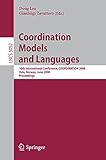Coordination Models and Languages [electronic resource] : 10th International Conference, COORDINATION 2008, Oslo, Norway, June 4-6, 2008, Proceedings /
Material type: TextSeries: Programming and Software Engineering ; 5052Publisher: Berlin, Heidelberg : Springer Berlin Heidelberg : Imprint: Springer, 2008Edition: 1st ed. 2008Description: X, 350 p. online resourceContent type:
TextSeries: Programming and Software Engineering ; 5052Publisher: Berlin, Heidelberg : Springer Berlin Heidelberg : Imprint: Springer, 2008Edition: 1st ed. 2008Description: X, 350 p. online resourceContent type: - text
- computer
- online resource
- 9783540682653
- 004.2 23
- QA76.9.S88
A Coordination Model for Service-Oriented Interactions -- Implementing Session Centered Calculi -- Service Combinators for Farming Virtual Machines -- Timed Soft Concurrent Constraint Programs -- Multiparty Sessions in SOC -- Formalizing Higher-Order Mobile Embedded Business Processes with Binding Bigraphs -- From Flow Logic to Static Type Systems for Coordination Languages -- Session Types for Orchestration Charts -- Implementing Joins Using Extensible Pattern Matching -- Advice for Coordination -- Modeling and Analysis of Reo Connectors Using Alloy -- Alternating-Time Stream Logic for Multi-agent Systems -- A Formal Account of WS-BPEL -- How to Infer Finite Session Types in a Calculus of Services and Sessions -- An Event-Based Coordination Model for Context-Aware Applications -- Formal Analysis of BPMN Via a Translation into COWS -- Encrypted Shared Data Spaces -- CiAN: A Workflow Engine for MANETs -- A Process Calculus for Mobile Ad Hoc Networks -- Actors with Multi-headed Message Receive Patterns -- A Compositional Trace Semantics for Orc.
This book constitutes the refereed proceedings of the 10th International Conference on Coordination Models and Languages, COORDINATION 2008, held in Oslo, Norway, in June 2008, as one of the federated conferences on Distributed Computing Techniques, DisCoTec 2008. The 21 revised full papers presented were carefully reviewed and selected from 61 submissions. The subject-matter is to explore the spectrum of languages, middleware, services, and algorithms that separate behavior from interaction, therefore increasing modularity, simplifying reasoning, and ultimately enhancing software development.


There are no comments on this title.